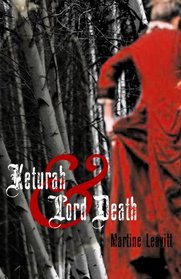Helpful Score: 1
I sped over to the library to pick up a copy of this book after reading a review of it online. This reads as a mix of Neil Gaiman's Stardust, 1001 Nights, and some well-known, often-told fairy tale. Keturah is a young village girl who follows a stag into the forest and gets lost for a few days. Eventually she sees Death come for her, but being the storyteller of the village, she tells Lord Death a story and then refuses to tell the ending unless she gets one more day of life and then, she promises, she will finish the story. What follows is a charming story about her village and the people in it, and of Keturah, and her relationships with her friends and family and with Lord Death. Told from the first person point of view this story reminds me of the first time I ever experienced a fairytale. While this is a young adult novel, it felt like it was written with no particular age in mind. A gem.
I chose to read this book after 'Rebekah' because in that story, Keturah is Abraham's concubine after he is widowed. But the Keturah in this book has no connection to the Biblical figure at all.
This book is a Gothic Folktale, relating in a very pure, fairytale style a story of a girl who follows an enchanted hart into the forest and meets with Lord Death. '1001 Nights'-style, she holds off the handsome and regal Death by telling him a story and withholding the ending, eliciting promises from him that she will be spared if she finds her true love. With a charm from the village witch, and now feared by her neighbors due to her connection to the uncanny, she desperately seeks both for love and to fend off the plague (that Death has prophecied) from her village.
Leavitt skillfully weaves together elements from many traditional tales with a good dose of originality and a smooth, enjoyable writing style. The only problem here is that I kept finding jarring inconsistencies in her portrayal of the life of the village - I think the book would have benefited from a closer adherence to the actualities of life in medieval England, since that is where it is ostensibly set. (If food is in such short supply, villagers would not be 'portly'; if lemons are worth their weight in gold, oranges would not be worthless; where did all the resources for a fair and town cleanup suddenly come from, etc, etc.)
Still, I loved the overall concept and aesthetic of the book, and would definitely read more from this author.
This book is a Gothic Folktale, relating in a very pure, fairytale style a story of a girl who follows an enchanted hart into the forest and meets with Lord Death. '1001 Nights'-style, she holds off the handsome and regal Death by telling him a story and withholding the ending, eliciting promises from him that she will be spared if she finds her true love. With a charm from the village witch, and now feared by her neighbors due to her connection to the uncanny, she desperately seeks both for love and to fend off the plague (that Death has prophecied) from her village.
Leavitt skillfully weaves together elements from many traditional tales with a good dose of originality and a smooth, enjoyable writing style. The only problem here is that I kept finding jarring inconsistencies in her portrayal of the life of the village - I think the book would have benefited from a closer adherence to the actualities of life in medieval England, since that is where it is ostensibly set. (If food is in such short supply, villagers would not be 'portly'; if lemons are worth their weight in gold, oranges would not be worthless; where did all the resources for a fair and town cleanup suddenly come from, etc, etc.)
Still, I loved the overall concept and aesthetic of the book, and would definitely read more from this author.
A lovely, endearing fairy tale, although I don't agree with the BOOKLISt review-the ending is not hard to guess. But that hardly matters. Written in the first person, it's a tale that transports you back to some ancient village, some time long ago. Nicely done!




